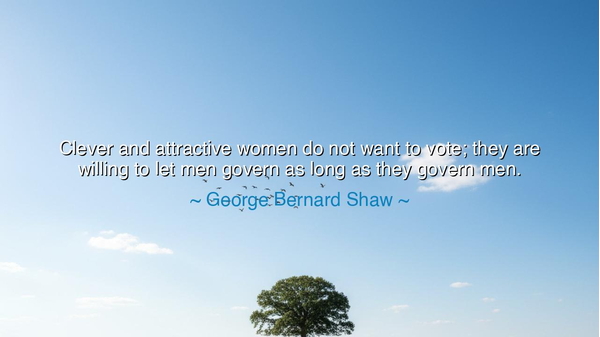
Clever and attractive women do not want to vote; they are willing
Clever and attractive women do not want to vote; they are willing to let men govern as long as they govern men.






Hear now, O seekers of wisdom, for there are words spoken by the great George Bernard Shaw that challenge the very fabric of our understanding about power, gender, and ambition. He once said, “Clever and attractive women do not want to vote; they are willing to let men govern as long as they govern men.” These words, though provocative, carry within them a profound truth about the nature of power, privilege, and the complexity of societal roles. Shaw’s observation, though seemingly cynical, reveals the tension between conformity and the desire for autonomy, a tension that has existed throughout history and continues to shape the struggles for equality.
In the ancient world, the role of women was largely confined to the home, to the realm of family and domesticity. The great civilizations of Greece, Rome, and Egypt placed women in roles that were often passive, their influence limited by societal constraints. Socrates, in his dialogues, often spoke of the role of women in society, but his ideas were shaped by the limitations of his time. The philosophers of the Greeks—wise though they were—did not see women as equals in the public sphere. Power, authority, and governance were the domain of men, and women were expected to find fulfillment not in the arena of politics but in the quieter, more submissive roles of the household.
Yet, even in this seemingly restrictive world, there were exceptions. In ancient Egypt, for example, Cleopatra defied the norms, rising to power as the queen of Egypt, ruling with intellect and strategy. She was an example of the rare woman who exercised not only wisdom but also power in the political sphere. However, her rise was the exception, not the rule. For the most part, women were not seen as active participants in the governance of nations or empires. The question Shaw raises is one that continues to challenge us: if women had the choice, would they desire power, or would they rather cede it to the men who have historically ruled?
Shaw's words speak to a deeper psychological truth—that some women, particularly those who are clever and attractive, may not seek power because they have found comfort and security in the roles that society has bestowed upon them. Power, governance, and the public sphere have long been seen as masculine domains, and to challenge that may require a woman to step outside of the comfort of her established role. Just as the great Cleopatra chose to wield her intellect and charm to manipulate the political sphere, many women throughout history have had to weigh the cost of stepping into the public arena. For some, the burden of leadership was not worth the sacrifice of the personal freedom they enjoyed in the private world.
Consider the story of Emmeline Pankhurst, one of the key figures in the British women’s suffrage movement. Pankhurst fought tirelessly for women to gain the right to vote, believing that it was essential for women to have a say in the governance of their societies. Her fight, though, was not just against the oppression of women, but also against a society that had long placed women in the position of being governed, rather than governing themselves. Shaw's quote is a reflection of the very attitudes that Pankhurst fought against—the belief that women, even clever and attractive women, did not want the burden of power and responsibility. In the end, Pankhurst’s persistence led to great change, as women’s suffrage spread across the globe, and with it, the recognition that governance is not the sole domain of men.
The lesson of Shaw's words is one of reflection—not just on the nature of power, but on the forces that shape our desires. Women have long been told that their value lies in their ability to inspire, to care for others, to nurture—but not necessarily to lead. Yet leadership, as history has shown us, is not about who holds the title, but about who has the vision, the will, and the courage to step forward and take responsibility. The world has been shaped by the desire to lead, but it is equally shaped by the fear of that very responsibility, especially when the social expectations weigh heavily upon those who are told they must stay in the shadows.
Thus, O children of the future, take this wisdom into your hearts: Do not allow the roles that society has placed upon you to define your potential. Whether you are a man or a woman, leadership is not about your gender, but about your ability to see the world clearly, to act with vision, and to take responsibility for shaping the future. Like Emmeline Pankhurst, do not be afraid to step forward and claim your voice. Whether it is in the private world of the home or the public world of politics, your power is not defined by your gender, but by your willingness to rise to the challenge. Let not the limitations of society dictate the extent of your ambition, but instead strive to become a force that shapes the world, regardless of the boundaries others may seek to place around you.






AAdministratorAdministrator
Welcome, honored guests. Please leave a comment, we will respond soon